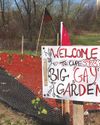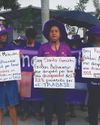
As I write this, the average market rent for a one-bedroom apartment in Toronto is $1,200. Nearly half of the city, 47 per cent, spends over a third of their income on rent, meaning that – without dipping into savings, which many don’t have – they are one missed paycheque away from losing their homes or going without food.
Of Toronto’s homeless population, over 11 per cent are lesbian, gay, bisexual, transgender, queer, and/or two-spirited (LGBTQ2S). Among youth, that number ranges from 24 to 40 per cent, depending on which researcher you ask. Just about every report on the subject finds that poverty disproportionately impacts queer and trans people, especially when they are Black, Indigenous, or people of colour. Being poor opens them up to greater violence and harassment by police. It reduces their employment opportunities and access to health care. It pushes them into shelters or other unsafe living situations, where they encounter discrimination and sexual violence from straight and cisgender staff and bunkmates. In every sense that matters, poverty is an LGBTQ2S issue.
So why aren’t mainstream Canadian LGBTQ2S organizations treating it as such?
Egale is Canada’s only nationwide LGBTQ2S charity. They helm an annual awareness and fundraising drive around the issue of LGBTQ2S homelessness that focuses nearly entirely on homophobia and transphobia as the causes of obscenely high homelessness rates among LGBTQ2S youth. Egale works on improving education and training among shelter staff and caseworkers, and it provides some support to individual service users who access the organization or its partners. It has also provided vital support to a small shelter specifically for LGBTQ2S youth in Toronto.
Diese Geschichte stammt aus der September/October 2019-Ausgabe von Briarpatch.
Starten Sie Ihre 7-tägige kostenlose Testversion von Magzter GOLD, um auf Tausende kuratierte Premium-Storys sowie über 8.000 Zeitschriften und Zeitungen zuzugreifen.
Bereits Abonnent ? Anmelden
Diese Geschichte stammt aus der September/October 2019-Ausgabe von Briarpatch.
Starten Sie Ihre 7-tägige kostenlose Testversion von Magzter GOLD, um auf Tausende kuratierte Premium-Storys sowie über 8.000 Zeitschriften und Zeitungen zuzugreifen.
Bereits Abonnent? Anmelden

PLATFORMS FOR PEOPLE, NOT PROFIT
Digital platforms boast that they’ve “democratized” cultural production. But what would truly democratic platforms look like in Canada?

ORGANIZING THROUGH LOSS IN THE HEART OF OIL COUNTRY
The story of climate justice organizing in Alberta, at the heart of the tarsands, is the story of a group of young activists learning what it means to lose, and keep on fighting

GROWING THE LABOUR MOVEMENT
How unions are using community gardens to engage members, nourish communities, and help strikers weather the picket line

A NEW ERA FOR OLD CROW
In the Yukon’s northernmost community, the Vuntut Gwitchin First Nation is reckoning with how to preserve their land and culture, amid a warming climate and an influx of tourists

“At Least Hookers Get Wages”
The risky business of sex work in the gig economy

The Literal – And Literary – Futures We Build
Briarpatch editor Saima Desai talks to two judges of our Writing in the Margins contest about Idle No More and MMIWG, ethical kinship, writing queer sex, and their forthcoming work.

The Cost Of A T-Shirt
In Honduras, women maquila workers are fighting back against the multinational garment companies that they say are endangering their health and safety.

Milking Prison Labour
Canada’s prison farms are being reopened. But when prisoners will be paid pennies a day, and the fruits of their labour will likely be exported for profit, there’s little to celebrate.

Bringing Back The Beat
In mainstream media, labour journalism has been replaced by financial reporting and business sections. But journalism students are raising the labour beat from the grave.

There's No Journalism On A Dead Planet
Corporate media owners are killing local newspapers – which is making it impossible for everyday people to understand the on-the-ground impacts of the climate crisis